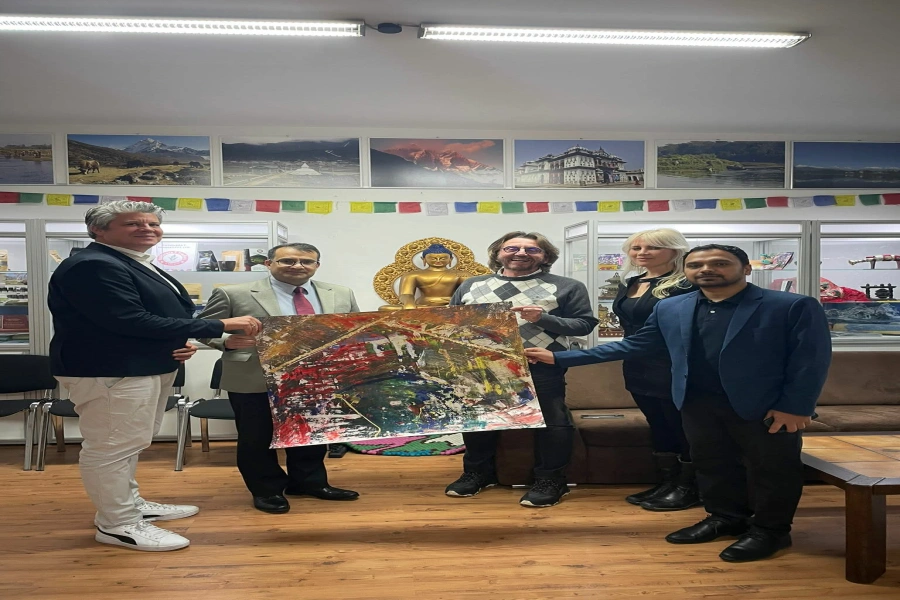"I can’t pay the school fees. Tell the children to stop going. I’ve been running from place to place, but not a single rupee has come my way. We’re neck-deep in debt, and no one is willing to help anymore," Pāmula Narasayya said, his voice heavy with despair as he looked helplessly at his wife.
"Don’t worry. If needed, I’ll go and talk to the headmaster," said Pāmula Venkatamma gently, handing Narasayya a glass of water with quiet reassurance.
“What right do I have to marry and have children when I can’t even feed them?" he lamented, looking at his wife with helpless eyes, his heart heavy with sorrow.
"Why do you say such things? Haven’t we endured this far without giving up? Are hardships meant only for us and not for others? If we hold on a little longer, things will surely get better. I’ll speak to the lady I work for—she’s kind-hearted. I’m sure she’ll help us with some money," she said.
He listened to his wife’s words, but no reply came to his lips. Quietly, he turned his gaze to the sky, lost in thought. After a while, sleep overtook him. Venkatamma’s mind kept racing until her thoughts grew tired. At last, she too drifted into sleep.
Narasayya hailed from Jeediguntapalli. Back in the village, he and his wife toiled as agricultural laborers. But repeated crop failures and the lack of proper educational opportunities for their children forced them to move to Hyderabad. It had been ten years since they left their village behind.
A severe drought ravaged the lives of farmers and agricultural laborers, compelling many families to abandon their villages and migrate to Hyderabad. They scraped by as domestic helpers, auto drivers, and daily wage laborers, huddling together in shared accommodations. But over time, the close-knit groups that had arrived together slowly drifted apart, spreading across different corners of the city.
Venkatamma worked as a domestic helper, while Narasayya was employed as a driver for a Marwadi businessman. One day, during a trip to his employer’s hometown, Narasayya met with a serious accident that left both his legs severely injured.
It had been two years since the accident. Though he could walk, he couldn’t stand for long or move around much. Doctors warned that if he resumed driving, his legs would deteriorate further. Unable to return to his old job, he started working in a small shop, helping pack goods, and later moved to a clothing store, folding and arranging garments after assisting customers.
Six months ago, Narasayya suffered a heart attack and underwent surgery at a government hospital. Since then, his body had grown frail. Medicines had taken over his daily routine—he was swallowing more pills than eating food. The unending stream of tablets and treatments left him frustrated and weary.
At times, he felt that dying would be easier than living like this. But the thought of leaving his mother, wife, and children as orphans drove him to endure the hardships.
Narasayya’s mother, Jeevamma, was around eighty, yet remarkably self-reliant. Despite her age, she had no major health issues and managed all her daily chores on her own. Back in the village, she had worked tirelessly—as an agricultural laborer, whitewashing houses, and selling firewood at the depot to make ends meet. She was never one to sit idle, always eager to take up any work that came her way.
Jeediguntapalli meant everything to Jeevamma. She had spent her entire life in that village and was deeply rooted in its soil. So when Narasayya and his wife decided to move to the city, she resisted with all her heart. “I won’t leave—no matter what. Even if I have to die, I will die here, where I was born,” she declared with unwavering resolve.
But Narasayya wouldn’t listen. The thought of leaving his mother behind tore at his heart. Despite her protests, he brought her to the city, hoping she would one day grow accustomed to this new life.
Jeevamma never took to city life. Whenever the house was empty, she would quietly slip out, board a bus, and head straight back to her village. There, in the familiarity of her small hut, she found dignity in work and a sense of peace that the city could never offer.
Each time, Narasayya would search for her and bring her back. But lately, someone was always keeping watch, making it harder for her to leave unnoticed.
Westerly wind's partial influence continues; Fog to blanket ter...

"You can’t live alone in the village at your age. Who will look after you if you keep running back there?" they tried to reason with her, but she wouldn’t listen.
"I don’t need anyone to look after me. I can manage on my own. They’re paying 200 rupees a day for labor! What’s the point of sitting around here?" she shot back.
"The whole village is gossiping that your son and daughter-in-law have abandoned you. You shouldn't be working at this age. I’ll make sure there’s food on your plate. Just stay home and look after the children," Venkatamma would say, raising her voice in frustration, trying to convince her.
In the beginning, Jeevamma couldn’t tolerate Venkatamma. The reason? She had given birth to three daughters. Jeevamma firmly believed that her son's misfortunes stemmed from not having a son. It was a deep-rooted belief, a misconception she clung to—and one for which she unfairly blamed her daughter-in-law.
When the children were young, Jeevamma would often grumble, “She couldn’t even give birth to a son. How is my boy supposed to manage?” But as the girls grew older, her perspective began to shift. She slowly realized that daughters could be just as capable—perhaps even more —than sons. In today’s world, she began to believe there was no real difference between boys and girls. In fact, she started to feel that daughters often showed more care and compassion than sons ever did.
Now, Venkatamma cares for Jeevamma as if she was her own mother. Jeevamma often tells anyone who will listen that if it weren’t for her daughter-in-law, her son’s life would have fallen apart. It was Venkatamma who stood by him after the accident—and again when he suffered from heart disease. Without her strength and support, Jeevamma believes, her son would not have survived.
With her son unable to work due to his heart condition, the family had no choice but to halt their children's education. Venkatamma carried the entire burden alone. Managing the household expenses on her meager income was a struggle—educating the children was simply out of reach.
Jeevamma, unable to bear the sight of their hardship, lost her appetite. She couldn’t stand sitting idle in the city and yearned for the familiar comfort of her village. One night, while the others slept, she quietly slipped out of the house—determined to return home.
At dawn, Narasayya’s eldest daughter woke up to study and noticed that Jeevamma was missing. Alarmed, she rushed to wake her parents.
“Why doesn’t Amma understand me?” Narasayya cried out. “Even after everything we've done, she still chooses that crumbling hut over staying here with us. I don’t even have the strength left to bring her back.” His voice cracked as tears welled up—he sat there, broken and helpless.
Two days later, Narasayya finally mustered the strength to go to the village. He stood before his mother, eyes pleading. “Amma, please come back with me,” he begged.
But Jeevamma remained unmoved. “I will never return to that city, even if it means dying here,” she said, her voice resolute. “This is the hut your father built for me. This is where I belong, and this is where I will take my last breath. I’m not afraid of living alone—I still have the strength to manage on my own. I’ll visit you all now and then, but don’t ask me to stay there.”
Left with no choice, Narasayya returned to the city, heavy-hearted. He didn’t want to leave his mother behind, but at least in the village, she would eat on time and live with dignity—far from the daily struggles and mounting worries they faced in the city.
At her workplace, Venkatamma couldn’t hold back her tears. She poured her heart out, explaining how they were drowning in debt, how her husband’s illness had made him unable to work, and how most of their earnings vanished into a pile of medical bills. “We can’t even afford our children’s school fees,” she said, her voice trembling.
Seeing her distress, a kind-hearted man offered to pay the eldest daughter’s school fees and assured Venkatamma that he would try to gather help from his friends for the other children. True to his word, he paid the fees for the eldest child.
But no one else came forward. As days passed and the deadline loomed, Venkatamma was left with no choice but to plead with the headmaster. He agreed, reluctantly, to let the younger two continue attending school—for now. Still, the pressure weighed heavily on her: the deadline for the remaining fees was drawing near, and the burden of uncertainty grew with each passing day.
It had been a month since Jeevamma had left for the village. Narasayya constantly worried about her—was she eating well? Was she managing on her own? He wanted to visit her, but circumstances didn’t allow him to leave.
Three days later, a money order arrived from the village, along with a letter. The letter, written by Shankaram Master on Jeevamma’s behalf, assured Narasayya that she was doing well and asked him to use the money to pay the children's school fees.
The moment he saw the money, Narasayya understood—his mother had gone back to work. A deep, unbearable pain tore through his heart. He wept uncontrollably, his tears flowing like a river. It felt as though his very flesh was being ripped apart. Clutching his wife and children, he sobbed, calling out, "Amma… Amma…"
No one could console him. Without wasting another moment, he left for the village.
When he arrived and found the house empty, Narasayya anxiously asked their neighbor, Shankaram Master, if he had seen her.
“She must have gone to the temple,” the old man replied casually.
Restless, Narasayya hurried toward the temple, his heart pounding.
Mother never goes to the temple.. why would she be there today? he wondered, unease tightening in his chest with every step.
Maybe there was a community meal today... he thought. Sometimes, during such events, the priest would call his mother to help wash the utensils. Did she come for that?
But as he looked around, there were no signs of any preparations—no crowd, no food, nothing. His concern deepened.
He stepped inside the temple, scanning the dimly lit sanctum and the surrounding halls. His eyes searched every corner, but she was nowhere to be found.
Worried, he approached the priest. "Have you seen my mother? Jeevamma?"
The priest nodded slightly. "She should be outside."
Narasayya’s heart began to race. He rushed outside and searched again, his eyes darting across the temple steps, the nearby trees, the quiet street beyond.
Where could she have gone? Doubt and fear crept in. He turned slowly, disheartened, ready to leave—
As he stepped down the temple stairs, his eyes caught sight of a frail figure, draped in a thick blanket, sitting still on the stone steps.
Is that my mother… or am I just imagining it? Uncertainty gripped him. He slowed his pace, hesitant, heart pounding as he drew closer.
Yes—it was her.
His mother sat silently among the beggars, her frame hunched, face weathered by the sun and sorrow. The moment she saw him, she pulled the blanket over her head, as if trying to disappear.
Narasayya stood frozen. Then, all at once, it felt like his already weakened legs shattered beneath him. His body gave way, and he collapsed onto the temple steps, his breath catching in his chest.
“My child!” With a cry of anguish, Jeevamma stumbled toward him, her hands trembling.
“Mother!”
Narasayya collapsed into her arms, clutching her tightly. His body shook with uncontrollable sobs as he buried his face in her lap—seeking the comfort only a mother could give. After what felt like a lifetime of suffering, he finally closed his eyes, as if finding peace at last.
A heavy silence followed. Time stood still.
Then, a voice rang out, harsh and jarring— "A dead body should not be kept in front of the temple. Take him away immediately!" the temple priest snapped.
Jeevamma sat frozen, the priest's words not fully registering. When they did, she let out a heart-wrenching wail.
Clutching her son's lifeless body, she wept bitterly. Her cries echoed through the temple courtyard, rising into the still morning air like a mother’s final prayer.
Venkatamma and her three daughters found their greatest strength in Jeevamma, who now lived with them. Together, Venkatamma and Jeevamma began selling dosas from a pushcart in Ameerpet of Hyderabad. What started as a humble effort soon blossomed into something much greater—Jeevamma’s dosas became famous across the city. Their cart drew regular customers, bringing not just a steady income but also dignity and respect to the family.









_20230329122016.jpg)





























